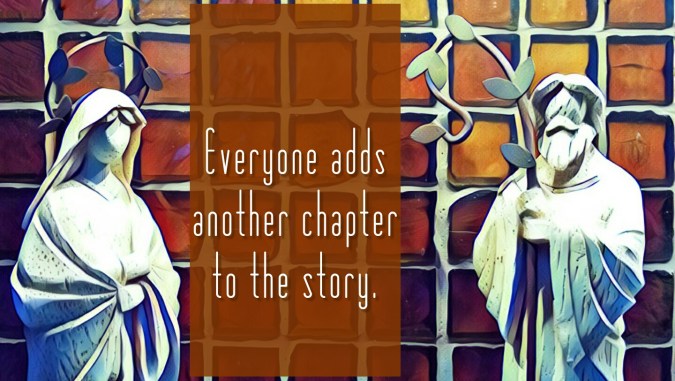
Today’s readings:
Psalms 98; 149, Isaiah 26:1-6, 2 Corinthians 5:16-6:2, John 8:12-19
Scripture challenges us to look at our fellow human beings from a different perspective that is often counter-intuitive to the one we are used to. In John and 2 Corinthians, Jesus and Paul tell us we need to stop seeing the world “according to the flesh” and start looking at it according to the spirit. Many people have interpreted this use of “flesh” to mean our bodies are evil, and somehow at war with our spirits—a sort of dualism that pits us against ourselves. Rather, Jesus and Paul use “flesh” as a metaphor for those things in the world and in ourselves that separate us from God. Sometimes that may mean our physical desires, but the desires themselves serve a purpose; our job is to direct them properly. Scriptures similarly use the word “world”—but God created and loves the world, just as he created and loves our bodies.
When Jesus tells us to see things according to the Spirit, what might that mean? It means we aren’t to judge anyone. Even Jesus—who is qualified to judge—has chosen to judge no one. This is a paradox of our faith: those who should not judge do, and those who might be worthy to judge choose not to. Of course we should be discerning in our associations, circumstances, and behaviors but judgment is strictly God’s purview. Any time we judge someone, we are seeing with the flesh, and not the spirit.
Paul tells the Corinthians that when we free ourselves from a human point of view, we will see Christians as new creations. The lack of judgment of others, from others, and of ourselves frees us to be entirely new. Ironically, it is this lack of need to conform to (or impose) worldly righteousness that transforms us into Christ’s righteous ambassadors.
In Christ we find not a religion—defined by those who measure up and those who don’t—but relationships. Immersing ourselves in Christianity takes courage, the courage of pioneers entering the wilderness of humankind and blazing trails to true relationship with others. Our true north is love. Our path is not the same as anyone else’s. Our adventure takes us places we can’t yet see.
Comfort: Your faith does not have to look like anyone else’s.
Challenge: When you judge people, forgive them and yourself.
Prayer: God of infinite love, lead me through the wilderness of faith. Amen.
Discussion: Are you more likely to judge others or yourself?
Join the discussion! If you enjoyed this post, feel free to join an extended discussion as part of the C+C Facebook group. You’ll have the opportunity to share your thoughts with some lovely people. Or feel free to comment here on WordPress, or even re-blog – the more the merrier!







